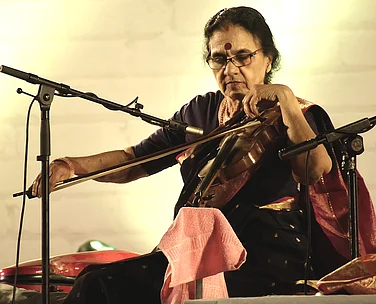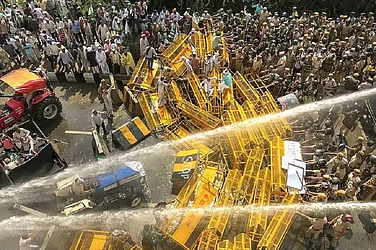While there have been reports of a drift—rather than a rift—between theMaran and Karunanidhi families, it is only two years after senior DMK leader andformer union minister Murasoli Maran’s death that there has been a publicacknowledgement of the growing distance. It was the late Maran, Karunanidhi’snephew, who had insisted that Karunanidhi’s family be made stakeholders 15years ago. Today, while many believe that Karunanidhi’s divestment owes to hisdisillusionment with the lack of coverage for his son and DMK deputy generalsecretary M.K. Stalin on Sun TV’s news bulletins and on the 24-hour channelSun News, it is actually the Maran camp which seems to have sought and securedthe "amicable settlement", according to party insiders. With the expansionof Sun’s media plans, Kalanithi Maran should be happier to have theKarunanidhi family out of his way.
Maran this year made a major advance in the print media, buying andrelaunching two daily newspapers—Tamizh Murasu (an eveninger) and Dinakaran(the third largest selling Tamil daily). Dinakaran, till recently knownfor its pro-DMK bias, has not necessarily prioritised the party’s interestspost-Maran. "Unlike Sun TV which blacks out large sections of the Tamil polityand even Karunanidhi’s family, in Dinakaran you could read about thePMK, MDMK, Left parties, the Congress and other DPA allies in Dinakaran.Today, Dinakaran behaves like Sun TV," says a DMK worker. Some of the oldPeriyarist outfits, like the journal Naathikam (Atheism), today refer toSun TV as the "brahminical channel". In the past few years, Karunanidhi hasoccasionally vocalised disenchantment with Sun TV’s coverage of party affairs.But now, conceding that the DMK can no longer rely on Sun TV, the DMKchief has introduced new editions of the party mouthpiece Murasoli inTrichy and Madurai, entrusting them to son M.K. Azhagiri. Karunanidhi has evenrevived The Rising Sun, an inconsequential English weekly, after threedecades, giving a pivotal role to Stalin.
Stalin, in fact, has been subjected to "partial solar eclipse". It is notjust non-DMK parties and leaders whose appearance on the dominant channel isdisproportionate to their importance and work. Members of Karunanidhi’s familyand sections of the DMK not considered close to and Union Minister forCommunications and Information Technology Dayanidhi Maran have beencold-shouldered. Some of the famous ‘blackouts’ effected recently by Sun TVare the non-reporting of the launch of a platform for freedomof expression by Kanimozhi (Karunanidhi’s daughter) and Karti P.Chidambaram (union finance minister’s son) in the context of the gagging ofKhushboo; the non-reporting of chief minister J. Jayalalitha’s meeting andsigning of an MoU with Microsoft Corporation’s Bill Gates; the general policyof not covering MDMK leader Vaiko; the near-absence of coverage for thepolitical party (Desiya Murpokku Dravida Kazhagam) launched by actor Vijaykanth;the one-sided "panic coverage" of natural disasters; and the inadequatecoverage of most non-DMK leaders "unless they are accidentally caught in thesame frame as Karunanidhi in a public function," as one union minister put it.
When Outlook contacted Sun Network's CMD Maran and vice-president (programming) Hansraj Saxena about these "charges", they refused comment.
A close aide of Vaiko told Outlook: "During the last parliamentaryelection, our leader campaigned in all the 40 constituencies for DPA candidates,including for Dayanidhi Maran in Chennai, but Vaiko was never shown on Sun."Says Congress leader and minister of state for commerce and industry E.V.K.S.Elangovan: "TV channels with a large share of the viewership have the socialobligation to provide complete, correct news. People have the right to know what’shappening. Personal/family issues should not inflect reporting." Elangovan isone among the 12 DPA ministers in the Union Cabinet, but unlike Dayanidhi whohas become for Sun what Rajiv Gandhi was for 1980s Doordarshan, Elangovan’sappearance is as rare as a solar eclipse. In a state where the pro-AIADMK JayaTV and the pro-DMK Sun TV blockade "rival parties", the PMK chief andAnbumani’s father S. Ramadoss last October talked of launching his own channelwhich would "focus on people’s issues".
Says Vijaykanth: "These two channels bother only about their parties. Theydo not care about the people." Denied space on the two ‘politicised’channels, Vijaykanth has been forced to purchase weekly slots on Vijay TV(controlled by the Star group) to reach a TV audience, an exercise MDMK’sVaiko had resorted to a few years ago. Today, the 24-hour Sun News channelmonopolises the current affairs slot. Jaya TV and Malar TV (of the Dinamalarnewspaper group), which had applied for 24-hour news channels, have been made towait for more than 18 months. Says a senior Jaya TV executive: "After theI&B ministry’s clearance, we imported and installed a teleport foruplinking and even completed the required test telecast. We got the mandatoryclearances from most of the 18 central agencies. But the Communications Ministryand other DMK-controlled ministries have been delaying clearance." Jaya TVwill be soon petitioning the Madras High Court against "the inordinate andunjustified delay".
The victims of monopolistic control over television are not just politicalplayers. The latest victim is the cricket fan in Chennai, which is perhaps theonly city that will not get to watch the India-Pakistan series. The ConditionalAccess System (CAS), which necessitates the use of a set-top box (STB) to view‘pay channels’ was introduced in Chennai on an experimental basis September2003. The experiment continues after 28 months. Back then, the DMK was part ofthe BJP-led NDA government. The Sun TV group, whose phenomenal success hinges onits near-total control over cable networks, was one the important players wholobbied for CAS. Back then, Dayanidhi Maran was CEO of Sumangali Cable Vision (SCV),one of the multisystem operators hawking STBs. Today, the DMK continues to be apart of the union government, if anything as an even more powerful player. AndCAS rules in Chennai.
It is interesting that Maran’s vision as IT minister is not any differentfrom what his agenda as head of SCV was. On the Sun Network’s website, some 18months ago, Maran had stated that SCV was looking "beyond cable TV" toprovide "high-speed internet access on TV… to be made possible throughenhanced set-top boxes". SCV’s vision is now the IT ministry’s vision.
Says Kannan, publisher-editor of Kalachuvadu , an alternativemagazine: "This is probably the only instance in the world where afamily-owned business has control over both politics and media, using one tostrengthen the other. Even Rupert Murdoch does not wield direct political power."
With elections just four months away, Karunanidhi cannot and does not want toantagonise the Marans—whose media empire the DMK will find indispensable. Infact, Karunanidhi appears to be firmly with the Marans. In a recent interview tothe popular Tamil weekly Ananda Vikatan, he disagreed with Kanimozhi’sopinions on la affaire Khushboo and dubbed his daughter’s forum Karuthuas pointless. Quoting Annadurai, he said, "You cannot air karuthu (opinions)as casually as a burp." Kanimozhi is the daughter of Karunanidhi's relationship with Rajathi Ammal (whom Karunanidhi refers to as a "companion"), unlike Stalin born to Dayalu Ammal, his legal "first wife".
Besides, the 82-year-old patriarch largely relies on Dayanidhi for the DMK’schannels with the Congress and its chief Sonia Gandhi. Sources in the DMK, waryof the Marans, regret that the Marans are indeed planning ahead for a post-Karunanidhiscenario. Their aim seems to be to eventually wrest control of the party,fronting Dayanidhi Maran as the chief ministerial candidate against Stalin. Fornow, Karunanidhi, who even put off a colon surgery that could have rendered himinactive, is in control. Unlike King Lear, he seems keen to hold on to whateverhe can as long as he can.


























